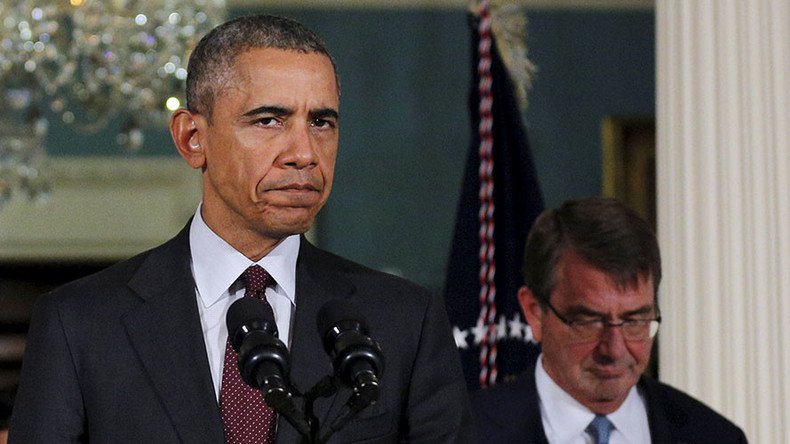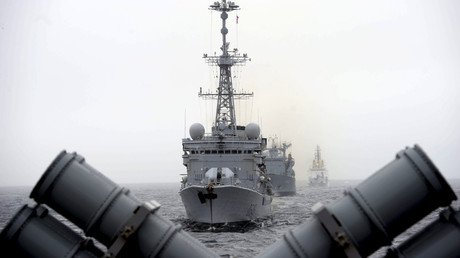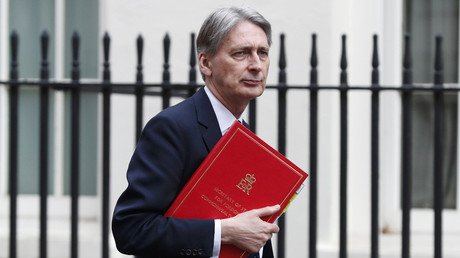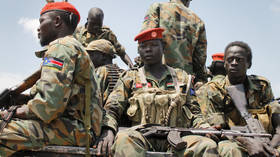‘Russia poses threat to US designs for global domination’

Russian moves on the global stage are interrupting the whole discourse about American superpower presence in the world. That would not be tolerated, says Gerry Sussman, Professor of Urban Studies and Planning at Portland University.
Barack Obama has warned the world to prepare for the threat of nuclear terrorism, but his Defense Secretary Ash Carter has placed other alleged threats even higher on the list.
READ MORE: Pentagon chief seeks reforms, calls Russia ‘No. 1 strategic threat’
Carter said reforms were necessary to make the US military more “agile” and able to address the five strategic challenges it faces, which he identified as ‘Russia, China, North Korea, Iran and terrorism.’
RT: Why do you think Russia is once again topping the Pentagon's threat list?
Gerry Sussman: I think Russia, just as the Soviet Union in an earlier era, serves as a kind of unifying theme for putting together a very disunified foreign policy around a common target. We can see this again and again. I was looking at the ‘Panama Papers’ reporting on CNN and the main focus was on President Putin rather than some of the American allies; Mr. Poroshenko in Ukraine, who has been actually listed where as you know Putin is not even listed, but there is an inference made about his associates, is the word they use. So, I think it serves as a unifying force to build a kind of a new Cold War consensus, to give some semblance of direction to American foreign policy where there really isn’t any.
The US has actually lost quite a bit of power over the years in the Middle East and Eastern Europe, and I think it’s just a way of creating an old bogeyman in the person of President [Vladimir] Putin and in Russia itself. And I think it is also because various US agencies involved in foreign policymaking – the State Department, the CIA, the military – are all in disarray with regard to working closely together and having one voice. I think it is also a reflection of this weakness of this particular (US) president who is in power. He refers to other agencies rather than showing political leadership in giving some direction to US foreign policy.
RT: Specifically, what threat does the Pentagon think Russia poses to the US?
GS: It represents a threat to America’s global interests, to its hegemony around the world. This is the mindset of the elites in American foreign policy decision making: Anything that constitutes… a balance of power approach, which I think is generally what Russia is pursuing, this constitutes a threat to a hegemonic power that seeks global domination wherever and whenever it has interests and its interest are military, oil, political interest in general, the interest of the transnational community, and the defense of the Israeli state. There are multiple interests and anything that stands in the way of disrupting US hegemony in the pursuit of these interests constitutes a threat.
RT: The US is fighting ISIS in Syria and Obama reiterated during the recent nuclear summit how dangerous the group is. Why is terrorism the last on the list of threats mentioned by the Pentagon?
GS: It’s instrumental. Terrorism comes in many forms and manifestations. It shows up here, it disappears there. But the long-term interest is global power. That’s at the top of the list. And whatever the reason maybe – whether it’s fighting ISIS, whether it is defending NATO’s interests here or there - in the long-term it is global interests and that’s the central feature of the American foreign policy agenda. So, it doesn’t surprise me that they would de-focus from time to time on ISIS, even though rhetorically terrorism is at the forefront of the rhetoric. To the extent that Russia actually plays a central role in defeating terrorism, as they did in their support for Syria and the recent defeat in Palmyra, this is really downplayed. This interferes with and interrupts the whole discourse about American superpower presence in the world. And that would not be tolerated. You would have to look at it structurally in terms of the role the mass media plays in this and the common interest that corporate media has with the state.
The statements, views and opinions expressed in this column are solely those of the author and do not necessarily represent those of RT.















